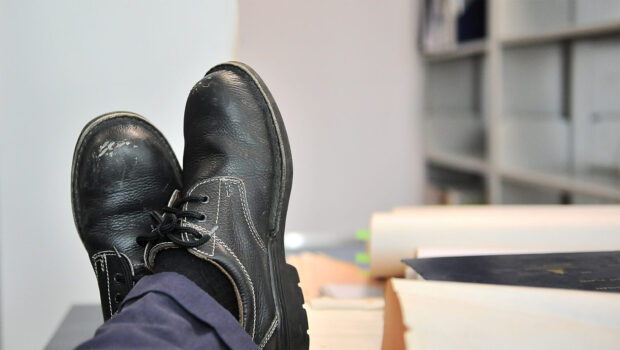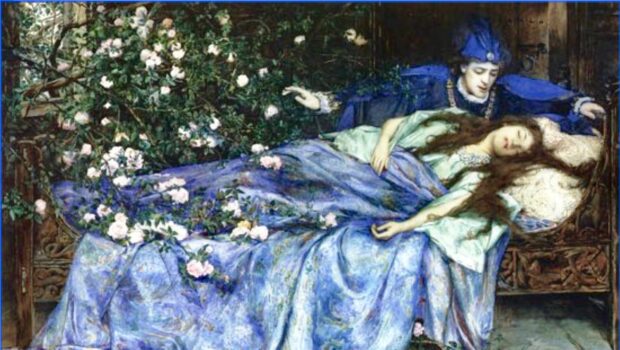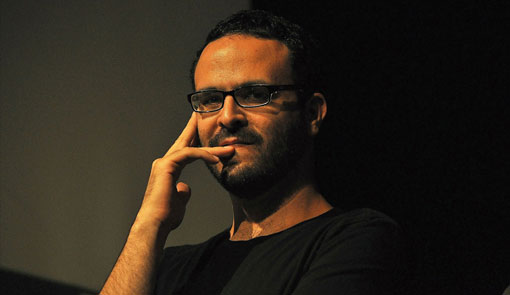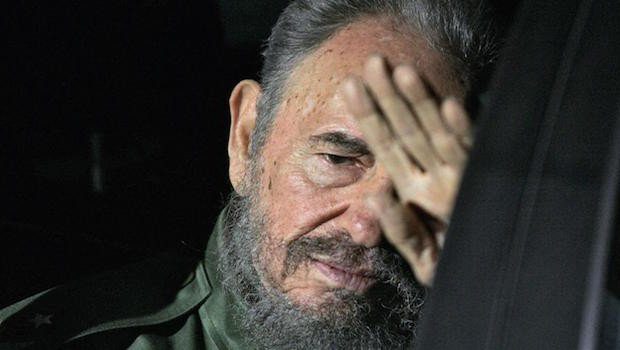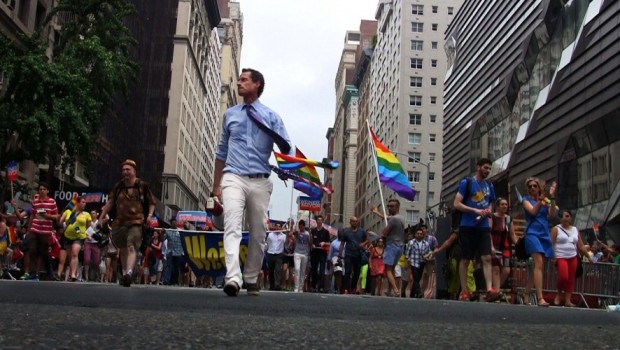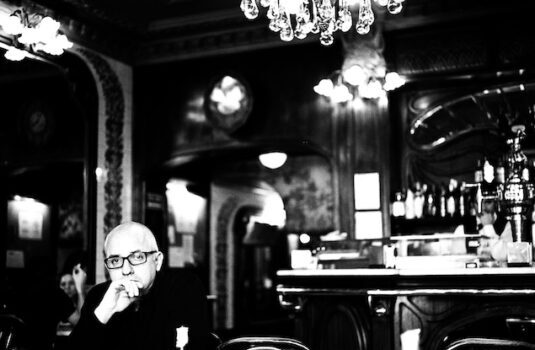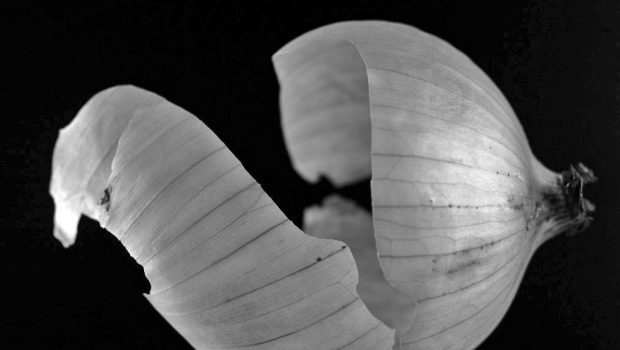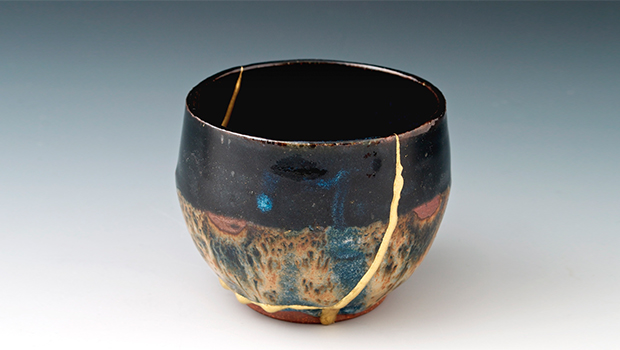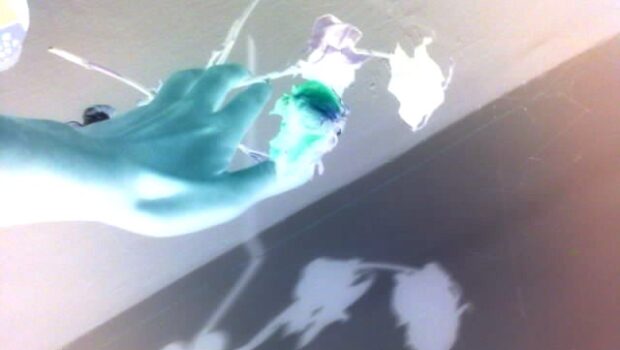THE NOIR REPORT
Informe negro
Francisco Hinojosa
English translation by Tanya Huntington
- I exhausted the Constitution and the Civil Code. Since I couldn’t find a single law against it, I became a certified private investigator in a modest ceremony for one.
- I had a hundred business cards printed up with a modern logo I designed myself.
- My home was transformed into an authentic detective agency. I arranged my books in a glass case confiscated from the dining room set. I also dusted off an old family sofa for my future clients and positioned a small bar cart next to my desk.
- I took out an ad in the newspaper offering absolute efficiency and discretion in all kinds of investigations.
- I called my boss to resign from my job at the paperclip factory. He was sorry to hear it: “You’ve really put us in a jam, Mr. Sanabria. No one knows this company better than you. It’s a crying shame.”
- I donned a new necktie and blazer, crossed my legs on top of my desk, and threw myself into reading the newspaper while I awaited the call of my first client.
- At two twenty in the afternoon, having pored over my own ad several times and all the other sections to boot, I went out to lunch. I needed a stiff drink to lift my spirits.
- I entered the bar, hung my hat and trench coat on a hook, and ordered a Scotch and soda with two submarine sandwiches on the side. By my third bite, I had a pretty good idea of how to promote myself at the bar while at the same time, practicing a few techniques from my new vocation.
- I showed the bartender the only photograph I happened to be carrying in my wallet. A recent portrait of my mother.
- “No, Sir,” he said. “People like her don’t come in here very often. Are you from the feds?”
- “Private eye,” I answered. “It’s possible that this woman may have murdered a man. If you see her around, give me a ring.” I offered him my card.
- Back at the agency, I called Mumsy. My sister told me she had gone out to fill some orders for those scarves she knits and wouldn’t be home before dark.
- I made the necessary small talk before cutting the conversation short, so as to keep the line free.
- Pleased with my performance at the bar, I fell asleep hoping the bartender would pass my card along to one of his regulars. Somebody with marital difficulties, perhaps.
- I woke up to the sound of the telephone ringing. I answered half-asleep, but managed to sound businesslike nonetheless. It was Francisca. The daughter of Adalberto, a former colleague at the paperclip factory. “Tom, we need to talk,” she said. “It’s terribly urgent.” I gave her an appointment for the following morning.
- At twelve minutes to eight, having patiently contemplated the telephone in all its silence, I decided to go back to the bar. Any detective worth his salt, I thought, would not give up so easily.
- Feeling rather foolish, I asked the bartender: “Nothing new, friend?” “No, Sirree. Same old, same old.” And he served me a dry martini instead of the Scotch I had ordered.
- It tasted like perfume, but I downed it without complaint. Then I showed my mother’s picture to the guy drinking next to me at the bar.
- Once he realized I was a private eye, he became more interested in the photograph. But despite all his efforts to recall every face he had ever seen, he didn’t recognize Mumsy.
- “What did she do?” he asked me. “Homicide,” I replied. We exchanged business cards. His name was Cornelio Campos, sales representative of a pharmaceutical company.
- That night, I dreamed Mumsy entered the bar, pulled a machine gun out of her purse and riddled the bartender with bullets. Cornelio fought back by lobbing a bottle of whisky at her head. It crashed onto her silvery mane of hair.
- As I was corroborating that my ad had in fact been run in the paper again, I heard a knock at the door. It was Francisca.
- I hadn’t seen her in five or six years. Although Adalberto and I came to be very close friends, we lost touch after I caught him stealing nearly a million and a half paper clips to be fenced on the black market.
- I had to excuse myself and go into the bathroom, where I could blush without her noticing.
- “Tom, you can’t imagine how surprised I was to see your name in the paper.” “So, you like reading the classifieds, do you?” I inquired, aghast. “Oh, no, Tom. Let me explain…”
- She told me her boyfriend had passed away the week before. Officially, it was deemed a suicide, but as far as Francisca was concerned, he had met with foul play. I asked her rather skeptically what motives she had to suspect something of such a delicate nature.
- “In the first place, Chucho would not have committed suicide: we were going to be married in August. Plus, he had a gun, so he had no reason to kill himself with a dagger. Not to mention the fact that Chucho confided in me a few days ago that someone was threatening his life…”
- Her sobs moved me. A tall glass of Scotch later, she was able to calm down and provide me with some key details for the investigation. She handed me a photograph of her former fiancé, his face somewhat obscured by a saxophone, and made me a list of people he was close to.
- She said goodbye with a kiss that didn’t quite graze my cheek and left before we could discuss my professional fees.
- Since every investigation has to start somewhere, which wasn’t going to happen with no money for expenses, I found myself obliged to call Mumsy and request a short-term loan.
- “Of course, Son. Come on by for it whenever you get a chance.” I reprimanded myself for having sullied her image and slid her photograph under the glass on my desk.
- I randomly chose a name from the list Francisca had drawn up. Since the house of Mr. Ardiles, father of the deceased, was located at a considerable distance from my agency, I decided to make a pit stop at the bar to mull over the questions I’d ask him.
- The bartender studied Chucho’s photograph carefully. “This is the victim?” “That’s right,” I deviously replied. “No, I don’t think I’ve seen him around here. Why is it you assume every guy in town comes into this joint? You could try casing some other place for a change…” I nodded and knocked back the two glasses that remained before me: one filled with Scotch, the other with shrimp broth.
- It took nearly an hour for the local bus to get to Mr. Ardiles’s house. After we met, I crossed him off my list of suspects. His face could have been that of a thief, or a rapist, or a dentist, but never a filicide.
- “I don’t know how Francisca got such a crazy idea into her head,” he told me. “Chucho was a solitary type, nervous and prone to depression. His suicide, to be honest, didn’t come as much of a surprise to me as it did to his mother or friends.”
- Joaquín Junco, owner of the corner store La Zorrita: “It must have been foul play, because he wasn’t the type of guy who goes around committing suicide out of the blue. Promise me that if you catch the son of a bitch who did it, you’ll let me know, so I can beat the crap out of him.”
- Georgina Mondragón, Chucho’s ex-girlfriend: “Poor Chubs, he was such a good soul… I don’t believe he killed himself, or that anyone else did for that matter.”
- Lucho Romo, childhood friend of the deceased and drummer in his jazz ensemble: “That cat Chucho? You ask me, he stepped on the gas. Let me break it down for you, Mister Sanabria: he chose the knife because they weren’t giving him his fix, you dig?” Of course, I didn’t dig a single word. Everything he said was utter nonsense. Poor kid.
- It was almost midnight by the time I arrived to collect Mumsy’s loan. She wasn’t home, as usual. She had left a stack of bills with my sister. I never imagined the scarf business could be so lucrative. I decided to take just one, a five-thousand peso note.
- Back at the agency, I lifted both legs onto my desk and started going through my notes. I still didn’t have any solid leads. The only interview that got me thinking was that of Georgina Mondragón: perhaps she was right, and this was neither a suicide nor murder, but an accident. Why not?
- Suddenly, I felt myself incapable of solving the case. I had to force down what was left of my bottle of whisky in order to fall asleep.
- When I awoke, Francisca stood there before me with a cup of coffee in one hand and my correspondence in the other. Her getup was a clear, well-defined, triumphant provocation. “Forgive me for bursting into your home this way, Tom. The door was open…”
- After shaving and getting dressed, I attended to Francisca. She was seated at my desk, waiting, another cup of coffee in her hands and a cigarette in her mouth.
- “Yesterday evening,” she began, “I got a telegram. This is proof that I’m not crazy, and that Chucho was murdered. I’m frightened, Tom, so very frightened.”
- LAMENTABLE SUICIDE (STOP) LET’S AVOID ANY MORE TRAGIC EVENTS (STOP) MANOLA.
- “I have no idea who this Manola could be, Tom. You’ve got to believe me. They want to kill me, too, and I don’t know why, truly…”
- I doused her tears with the remainder of the bottle of brandy I kept in the liquor cabinet. Then I tucked the telegram into my pocket and asked Francisca to stay put at the agency, because it might be too dangerous for her to be out on the streets alone. I offered her my library.
- Before my next stop at the telegraph office, I decided to swing by and visit Chucho’s mother. On my way there in the cab, I couldn’t erase Francisca’s figure from my mind.
- A sudden hunch led me to venture an idea: “Mrs. Pereira,” I told her, “a friend of your son’s, a guy by the name of Lucho, insinuated that your son was no longer getting fixed. Do you have any idea what he might have been referring to?”
- “Chucho was a good boy, Mr. Sanabria, you’ve got to believe me. I admit he did have that one tiny defect. But what was really sinking him weren’t the pills. The real problem is, he was playing middle man between his friends and the purveyors of that merchandise, if you catch my drift.”
- Of course I caught her drift. I’d already harbored the suspicion that there was something rotten about this case: drug addiction, drug dealing, pharmacodependence. Something in that face concealed behind the saxophone.
- Mrs. Pereira was unable to provide me with any more clues. As I took my leave, she seemed so overwrought that I decided to leave my card on the table in the foyer.
- The employee at the telegraph office laughed in my face when I said I was a private eye looking for whoever had sent the telegram. “You think I actually read the stupid shit people write? Well, that’s where you’re wrong, my friend. I just count the words and ring up the tab.”
- I threatened him with being an accessory to murder if he didn’t cooperate, but all I got for my troubles was kicked out of the office, in addition to some rather colorful insults to which I made no reply, out of professional ethics.
- I stopped at the supermarket for a bottle of whisky and two orders of pre-cooked paella.
- When I entered the agency, Francisca didn’t so much as bother to lower her legs from my desk. I caught her reading my correspondence.
- We looked each other in the eye for a long moment without saying a word. Finally, I went over to her, confiscated the letter she had opened, grabbed her purse, and emptied it out onto the desk.
- A lipstick, a pen, a coin purse, a hairbrush filled with blonde strands, a packet of Kleenex, a pair of nylon stockings, two limes, and a little bottle of red and yellow pills.
- “What I didn’t count on was you lying to me,” I groused. “Better start by telling me who Chucho was buying this crap from.”
- Finally, she deigned to lower her legs from my desk, then rushed to embrace me with all her might. I had a soft spot for her. My anger melted into compassion. “I’m so frightened, Tom. If they were capable of killing Chucho, they won’t stop when it comes to me. Don’t let them kill me, please, Tom, don’t let them…”
- After we had inaugurated the bottle of whisky, I accommodated her on the client sofa and promised no less than a dozen times that they weren’t going to kill her as long as I lived and breathed. “Don’t you worry, little lady, Tom will protect you. All you need to do is be a good girl and tell me who Chucho was getting those pills from.”
- “I went with him a few times. He called the guy Richard. Unless things have changed, you can find him from four to five in the afternoon at a bar called La Providencia. He’s a fat, grey-haired, wrinkled old man. He wears cowboy boots and suspenders. But he’s dangerous, Tom. Don’t let him kill you.”
- After I was finally able to set her at ease and leave her dozing on the client sofa, the telephone rang. It was the bartender. He said that the suspect I was trailing was in his bar at that very moment.
- “Mumsy, in a bar?” I asked myself.
- The physical resemblance was astonishing from a distance, I’ll admit, but anyone who knows my mother would never confuse her with such a vulgar sort. The bartender turned out to be a bit short-sighted when it came to the human soul.
- Still, I found myself obliged to play the detective in order to attract future clients. The conversation was going to be rough going, given that Cornelio and the bartender were watching me closely. As if from one moment to the next, I was going to slap a pair of cuffs on the dame and read her her rights.
- Maybe it was the tedium caused by the situation that led me to attempt the same maneuver I had used on my new client with such positive results.
- I came up from behind and with a brusque gesture, tried to empty her purse out onto the table. Her reaction was nothing like Francisca’s. The suspect smashed her revolting glass of vodka in my face before her personal effects had time to reach the tabletop. As I realized my mistake and tried to defend myself, the dame finished me off with an ashtray to the nose that clouded my vision.
- When I came to, Cornelio was attempting to administer a glass of beer to me. “We couldn’t stop her, Mr. Sanabria,” the bartender apologized. “She was on such a rampage, she could have taken on a whole army by herself. I believe you now. She must be some kind of dangerous killer.”
- “Don’t worry,” I tried to set my afflicted companions at ease. “At this very moment, the real killer is sitting in a bar called La Providencia.”
- Cornelio offered to accompany me. He had a ’50-something Ford that threatened to break down on every corner. On the way there, I told him what little I knew about this Richard fellow.
- “Fear not, my good detective,” he comforted me. “I’m packing a knife, and I know how to use it.” I was forced to lie: I assured him I was carrying a revolver in the pocket of my blazer.
- At four-thirty, we arrived at La Providencia. None of the individuals at the bar fit the description Francisca had given me of Richard. We ordered a couple of beers.
- While we were waiting for the murderer to show his face, Cornelio told me his life story. After convincing me that he was quite an expert at handling a variety of weapons, from shotguns to ropes, he confessed that he had done time for trying to choke his wife to death.
- He was starting to lay out the motives that led him to his frustrated attempt at spousicide when we made Richard, clad in cowboy boots and suspenders. He was drinking tequila and beer at the table next to ours.
- In order to prevent him from having enough time to escape or attacking us first, a brilliant plan occurred to me that I shared in secret with Cornelio.
- Under the pretext of feigned drunkenness, my companion and I climbed up onto the table, ostensibly to dance the cha-cha to the music that echoed in the bar. But instead of keeping time, we pounced onto our man like jungle cats.
- Cornelio grabbed him by the neck, and I grabbed him by the waist. Richard couldn’t so much as swallow his mouthful of tequila.
- “We’ve got the drop on you,” I said, seeing how he was blinded by surprise. “One false move, and we won’t hesitate to drill a hole in your belly, you pig.”
- In measured, grave, intelligent tones, I informed everyone present that we were police officers, and that we needed everyone except for the employees to exit the bar immediately.
- Then I ordered Richard to keep his hands spread on the floor while I searched him. I found a .38 special in his blazer pocket and a .45 tucked in the waistband of his pants. I passed Cornelio the lower caliber gun.
- “Now you’re going to be a good boy,” I badgered the suspect, “and come quietly with us. If you try to escape, you can kiss your tequilas goodbye.” On our way out, I tossed a thousand-peso bill onto the bar.
- The old man’s docile nature made me a little uneasy. He did everything we asked him to without a peep. We loaded him into the Ford. Before the interrogation, we took him for a ride down empty streets.
- “We are no friends of yours,” I threatened, “of that you can be sure. You stand accused of homicide under several aggravating circumstances, in addition to trafficking of narcotics and corruption of minors. We aren’t even going to bother reading you your rights.” “You have no evidence against me,” he defended himself. “I haven’t killed anybody, for real… it wasn’t me.”
- “Must have been Mr. Nobody,” Cornelio clumsily mocked him. “At this very moment, Richard, we are going to take you to a room with no windows, where all of Chucho’s friends are ready and waiting. You do remember him, right, Poopsie?” Cornelio played the bad cop rather poorly, but there was a certain subtlety to his threats that satisfied me.
- “I repeat, I did not kill that boy, and there is no evidence against me. Do your worst: I won’t spill the beans.” After dealing Richard a strong jab to the ribs, Cornelio fired up his nondescript Ford jalopy.
- After a good beating, Richard softened up and proposed we make a deal: he would take us to Manola, the real killer and boss of the drug ring, in exchange for his freedom. I answered him that the most I could do would be to release him once we had this so-called Manola in custody. After that, he would be on his own.
- “Excellent, my good detective, excellent,” Cornelio said admiringly, anxious to leap into action and demonstrate his knife wielding skills. It didn’t take long for me to disappoint him.
- “We may need some backup before we go barging into Manola’s place. We don’t know how many men might be lying in wait. But don’t worry, I can take care of that. I’ve got a friend on the force. You babysit Richard while I make a phone call.”
- Chief Cipriano Herrera used to work as a detective for the paperclip factory. I saved him from getting fired once for falling asleep on the job. He promised to return the favor someday. When the police force hired him, he placed himself at my service. I dialed his number.
- “Where can I find you, Tomás?” “I’m at the corner of La Paz and Revolución. The snitch is here with me, plus a friend who has a pistol aimed at him as we speak.” “I’ll be about fifteen minutes,” he said, “wait for me there.”
- I also called Francisca to ask her to join us, so she could witness the outcome of the case she had entrusted to me.
- Back in the Ford, Richard’s hands had been tightly bound with a necktie. Cornelio jabbed at his ribs with the knife: “He tried to make a break for it, Tomás, but I know how to tie a hog. Isn’t that right, Ri-car-do?” he contemptuously addressed the accused.
- Francisca got there first and planted a warm kiss on my cheek, followed soon after by Cipriano in an old unmarked Mercedes. He embraced me so hard, anyone would have thought we were two brothers, reunited after the war.
- He pulled Richard by the hair into the back of his Mercedes, where three other men were waiting with their respective rifles. “We’ve been trailing Manola for several years now. So actually, you are the one doing me the favor. I’ll find some way to repay you.”
- We headed south to the suburb of Tlalpan, the very same neighborhood where I spent much of my childhood and adolescence.
- Visions of the soccer games we played as kids against a team from the boulevard danced in my head. Ah, the good old days!
- The Mercedes pulled over. The first one out was Richard, followed by four police officers’ backs. We came next: Cornelio, belligerent and Francisca, fearfully tucked under my wing.
- It seemed I’d never felt my heart beat so fast. And it wasn’t because of all the excitement from successfully bringing my first case as a private eye to a close, but because of the surprise destiny had in store for me.
- As the door to the house fingered by Richard opened wide, the tears welled up in my eyes. Cornelio cried out joyously: “It’s her, Tomás, the woman from the photograph. We found her!”
1. Agoté la Constitución y el Código Civil. Como no encontré ninguna ley que lo prohibiera me autonombré detective privado en una ceremonia íntima y sencilla.
2. Mandé imprimir un ciento de tarjetas de presentación con un logotipo moderno que yo mismo diseñé.
3. La sala de la casa quedó transformada en una auténtica oficina de detective. Ordené mis libros detrás del escritorio, en una vitrina que resté al mobiliario del comedor, desempolvé un viejo sillón de familia para los clientes y dispuse el carrito-cantina junto al escritorio.
4. Pagué un anuncio en el periódico en el que ofrecía absoluta eficacia y discreción en toda índole de investigaciones.
5. Renuncié por teléfono a mi trabajo en la fábrica de clips. Mi jefe se lamentó: “Nos mete en un apuro, señor Sanabria, nadie como usted conoce esta empresa. Es una lástima.”
6. Me puse corbata nueva y un saco sport, eché las piernas sobre el escritorio y me entregué a la lectura del periódico en espera de la llamada de mi primer cliente.
7. A las dos y veinte de la tarde, después de haber leído varias veces mi anuncio y de consumir todas las secciones, salí a comer. Necesitaba un trago fuerte para reanimarme.
8. Al llegar al bar colgué mi sombrero y mi gabardina en el perchero y pedí un escocés con agua mineral y dos tortas. A la tercera mordida tuve una buena idea que me permitiría autopromoverme en el bar al tiempo que practicar algunas técnicas de mi nuevo oficio.
9. Le mostré al cantinero la única fotografía que llevaba en mi cartera. Un retrato reciente de mamá.
10. “No, señor”, me dijo. “Personas como ella no son muy frecuentes en este lugar. ¿Es usted de la judicial?”
11. “Detective privado”, le contesté. “Es probable que esta mujer haya asesinado a un hombre. Si la ve por aquí, no deje de avisarme.” Le extendí mi tarjeta.
12. Al regresar a la oficina le llamé a mamá. Mi hermana me dijo que había salido a surtir algunos pedidos de las bufandas que teje y que llegaría hasta la noche.
13. Hablé con mi hermana lo indispensable para colgar y dejar así libre la línea del teléfono.
14. Contento de mi buena actuación en el bar, me dormí con la esperanza de que el cantinero pudiera turnar mi tarjeta a alguno de sus clientes con problemas matrimoniales.
15. Me despertó el sonido del aparato. Contesté con la voz un tanto adormilada pero aún atractiva. Era Francisca, la hija de Adalberto, un antiguo colega de la fábrica de clips. “Tom, necesito hablar contigo”, me dijo. “Es muy urgente.” Le di cita al día siguiente por la mañana.
16. A las ocho menos doce, luego de contemplar pacientemente la quietud del teléfono, decidí volver al bar. Un detective serio y analítico, pensé, no debería desesperarse tan pronto.
17. Me sentí un estúpido cuando le pregunté al cantinero “¿Nada nuevo, amigo?” “No, señor. En absoluto.” Y me sirvió un martini seco en vez del escocés que le había pedido.
18. Preferí tomarme ese perfume y no reclamar. Mostré la fotografía de mamá a un hombre que bebía junto a mí en la barra.
19. Cuando supo que yo era detective se interesó más por la fotografía. Pero a pesar de los esfuerzos que hizo por repasar mentalmente todos los rostros que alguna vez había visto, no reconoció a mamá.
20. “¿Qué ha hecho?”, me preguntó. “Homicidio”, respondí. Intercambiamos tarjetas de presentación. Se llamaba Cornelio Campos, representante de una compañía farmacéutica.
21. Por la noche soñé que mamá entraba al bar, sacaba de su bolsa una ametralladora y acribillaba al cantinero. En respuesta, Cornelio le arrojaba una botella de whisky que se estrellaba en su blanca cabellera.
22. En el momento en que comprobaba que mi anuncio había vuelto a aparecer en el periódico llamaron a la puerta. Era Francisca.
23. Hacía cinco o seis años que no la veía. A pesar de que Adalberto y yo llegamos a ser amigos muy cercanos, nos distanciamos porque lo descubrí robándose casi un millón y medio de clips para venderlos en el mercado negro.
24. Tuve que disculparme e ir al baño para ruborizarme sin que ella se diera cuenta.
25. “Tom, no sabes la sorpresa que me dio encontrarme con tu nombre en el periódico.” “¿Te gusta leer los anuncios clasificados?”, le pregunté con horror. “Oh, no, Tom. Déjame contarte…”
26. Me dijo que su novio había muerto la semana pasada. Según la versión oficial se había suicidado y según la suya lo habían asesinado. Le pregunté con tono escéptico cuáles eran las razones que tenía para sospechar algo tan delicado.
27. “En primer lugar, Chucho no se hubiera suicidado: íbamos a casarnos en agosto. En segundo, él tenía una pistola, no había razón para matarse con un puñal. Y en tercero, Chucho me había confiado unos días antes que alguien lo había amenazado de muerte…”
28. Sus sollozos me conmovieron. Cuando por fin pudo calmarse tras un largo vaso de escocés, terminó de contarme algunos detalles importantes para la investigación, me dio una fotografía de su ex novio, con el rostro un tanto escondido por un saxofón, y me hizo una lista de las personas con las que tenía relaciones estrechas.
29. Se despidió de mí con un beso que no llegó a hacer contacto con mi mejilla y salió sin que habláramos antes de mis honorarios por conceptos profesionales.
30. Como de alguna manera tenía que empezar las investigaciones, y sin dinero eso era imposible, tuve que llamarle a mamá para pedirle un préstamo a corto plazo.
31. “Por supuesto, hijo, puedes pasar por él cuando quieras.” Me reclamé a mí mismo las ofensas que le había hecho a su imagen. Guardé la fotografía bajo el cristal de mi escritorio.
32. Elegí al azar un nombre de la lista que elaboró Francisca. Como la casa del señor Ardiles, padre del finado, estaba muy lejos de mi oficina, decidí hacer una escala en el bar para pensar en las preguntas que le haría.
33. El cantinero miró detenidamente la fotografía de Chucho. “¿Es la víctima?” “Por supuesto”, le respondí con malicia. “No, no creo haberlo visto por aquí. ¿Por qué cree usted que toda la gente de la ciudad viene a este bar? Podría intentar en otros…” Asentí con la cabeza y apuré los dos tragos que me restaban: uno de escocés y el otro de caldo de camarón.
34. El colectivo que me llevó hasta la casa del señor Ardiles tardó casi una hora en llegar. Desde que lo vi lo borré de la lista de sospechosos, pues podría tener cara de ladrón, de violador o de dentista, pero nunca de filicida.
35. “No sé por qué se le ha metido esa idea en la cabeza a Francisca”, me dijo. “Chucho era un chico solitario, nervioso y con tendencia a la depresión. Su suicidio, en verdad, no me sorprendió tanto como a su madre o a sus amigos.”
36. Joaquín Junco, dueño de la miscelánea La Zorrita: “Yo también creo que lo mataron, porque ese muchacho no es de esos que andan suicidándose así porque sí. Prométame que si agarra al hijo de puta que lo mató me va a avisar para que yo le ponga una buena madriza.”
37. Georgina Mondragón, ex novia de Chucho: “Pobre Gordito, era tan bueno… Yo no creo que se haya suicidado ni que lo hayan matado.”
38. Lucho Romo, amigo de la infancia del occiso y batería del grupo de jazz: “Pinche Chucho, yo creo que se aceleró. Le voy a decir la neta, míster Sanabria: se agarró la puñalada porque ya no lo estaban surtiendo, ¿me entiende?” Por supuesto que no le entendí una sola palabra. Todo lo que me dijo eran puras incoherencias. Pobre chico.
39. Casi era medianoche cuando llegué a recoger el dinero a casa de mamá. Ella no estaba, como ya era su costumbre; me había dejado un fajo de billetes con mi hermana. Nunca pensé que las bufandas le pudieran dejar tanto. Decidí tomar sólo uno de a cinco mil.
40. De regreso en la oficina, eché las piernas sobre el escritorio y me puse a revisar mi libreta de apuntes. Aún no tenía ninguna pista concreta. El único comentario que me preocupaba era el de Georgina Mondragón: quizá fuera cierto que no se trataba de un suicidio o de un asesinato. Un accidente, por qué no.
41. De pronto me sentí incapaz de resolver el caso. Tuve que empujarme lo que sobró de la botella de whisky para quedarme dormido.
42. Al despertar, Francisca estaba frente a mí, con una taza de café en una mano y con mi correspondencia en la otra. Su atuendo era una provocación clara, definida, victoriosa. “Perdona que haya entrado así a tu casa, Tom. La puerta estaba abierta…”
43. Después de afeitarme y vestirme volví con Francisca. Me esperaba sentada en mi escritorio, con otra taza de café en las manos y con un cigarrillo en la boca.
44. “Ayer por la noche”, empezó, “recibí un telegrama. Es la prueba de que no estoy loca, de que Chucho fue asesinado. Tengo miedo, Tom, mucho miedo.
45. LAMENTABLE SUICIDIO (PUNTO) NO QUEREMOS OTRO SENSIBLE ACAECIMIENTO (PUNTO) MANOLA.
46. “No tengo idea de quién pueda ser esa Manola, Tom. Debes creerme. También a mí me quieren matar y no sé por qué, de verdad…”
47. Apagué su llanto con un poco de brandy que sobraba en la licorera. Guardé el telegrama y le pedí a Francisca que se quedara en la oficina porque podía ser peligroso que estuviera sola en la calle. La ofrecí mi biblioteca.
48. Antes de pasar a Telégrafos decidí darme una vuelta por la casa de la mamá de Chucho. Durante el trayecto del taxi no pude quitarme de la cabeza la figura de Francisca.
49. Tuve una repentina corazonada que me llevó a aventurar un comentario: “Señora Pereira”, le dije, “un amigo de su hijo, un tal Lucho, me insinuó que a su hijo no lo surtían. ¿Tiene idea de a qué se refería?”
50. “Chucho era bueno, señor Sanabria, créamelo. Reconozco que tenía ese pequeño defecto. Pero lo que lo estaba hundiendo no eran las pastillas. El verdadero problema era que él servía de intermediario entre sus amigos y los vendedores de la mercancía, ¿me explico?”
51. Por supuesto que se explicaba. Ya había tenido la sospecha de que existía algo turbio en el caso: drogadicción, narcotráfico, farmacodependencia. Sabía que algo tenía aquel rostro oculto tras el saxofón.
52. La señora Pereira no pudo darme ninguna pista más. Al despedirme la vi tan afligida que preferí dejarle mi tarjeta en la mesa del recibidor.
53. El empleado de Telégrafos se rio de mí cuando le dije que era detective privado y que estaba buscando a la persona que había escrito el telegrama. “Usted cree que yo me dedico a leer las pendejadas que escribe la gente. Pues se equivoca, amigo, yo sólo cuento palabras y cobro el importe.”
54. Lo amenacé de complicidad en el homicidio si no cooperaba, pero solamente logré que me despidiera con un par de altisonantes insultos, a los que no respondí por ética profesional.
55. Paré en el supermercado para comprar una botella de whisky y dos órdenes de paella preparada.
56. Al entrar en mi oficina, Francisca no hizo siquiera el intento de bajar las piernas de mi escritorio. La sorprendí leyendo mi correspondencia.
57. Nos miramos a los ojos un largo minuto sin decir palabra. Por fin me acerqué a ella, le arrebaté la carta que había violado, tomé su bolso y lo vacié sobre el escritorio.
58. Un bilé, un bolígrafo, un monedero, un cepillo atiborrado de cabellos rubios, un estuche de kleenex, un par de medias nylon, dos limones y un frasquito con pastillas rojas y amarillas.
59. “No contaba con que tú me mintieras”, le reclamé. “Será mejor que empieces por decirme a quién compraba Chucho esas porquerías.”
60. Por fin se dignó bajar las piernas de mi escritorio y corrió a abrazarme con todas sus fuerzas. Mi debilidad ayudó a que el enojo se transformara en compasión. “Tengo miedo, Tom. Si fueron capaces de matar a Chucho, también lo harán conmigo. No dejes que me maten, por favor, Tom, no dejes que…”
61. Luego de estrenar la botella de whisky la recosté en el sillón de los clientes y le prometí no menos de una docena de veces que no la iban a matar mientras yo viviera. “No te preocupes, pequeña, Tom te va a proteger. Sólo necesitas ser buena y decirme a quién le compraba Chucho esas pastillas.”
62. “Lo acompañé varias veces con el vendedor. Le dicen Richard y, si las cosas no han cambiado, se le puede encontrar entre las cuatro y las cinco de la tarde en un bar llamado La Providencia. Es un hombre gordo, canoso, arrugado. Siempre usa botas vaqueras y tirantes. Es peligroso. No dejes que te mate.”
63. Cuando por fin la pude dejar dormida sobre el sillón de los clientes llamaron por teléfono. Era el cantinero. Dijo que la persona a la que yo buscaba se encontraba en esos momentos en su bar.
64. “¿Mamá en un bar?”, me pregunté.
65. El parecido físico era sorprendente, lo reconozco, pero quienquiera que conozca a mamá no podría confundirla con semejante vulgaridad de señora. El cantinero resultó ser un poco miope en lo que se refiere a las almas humanas.
66. Sin embargo, me vi obligado a seguir el juego detectivesco para atraer a futuros clientes. La conversación con ella fue difícil, ya que Cornelio y el cantinero me observaban atentamente, como si de un momento a otro yo fuera a ponerle esposas a la señora y a leerle sus derechos.
67. Quizás fue el aburrimiento que me causaba la situación lo que me llevó a practicar la misma técnica que utilicé con mi nuevo cliente y que tan buenos resultados me dio.
68. Con un movimiento brusco, intenté vaciar su bolso sobre la mesa. Pero, por una reacción contraria a la que tuvo Francisca, la sospechosa me estrelló en la cabeza su asqueroso vaso de vodka antes de que sus efectos personales terminaran de hacer contacto con la mesa. En cuanto me di cuenta de mi error y traté de defenderme, la señora me remató con un cenicero en la nariz que me nubló la vista.
69. Al volver en mi, Cornelio intentaba darme un trago de cerveza. “No pudimos detenerla, señor Sanabria”, se disculpó el cantinero. “Estaba tan furiosa que bien hubiera podido enfrentarse con un ejército. Ya lo creo que debe tratarse de una asesina peligrosa.”
70. “No se preocupen”, calmé a mis afligidos interlocutores. “El verdadero asesino se encuentra en eso momentos en un bar llamado La Providencia.”
71. Cornelio se ofreció a acompañarme. Tenía un Ford cincuenta y tantos que amenazaba con dejarnos en cada esquina. Por el camino le platiqué lo poco que sabía acerca del tal Richard.
72. “No tenga miedo, mi detective —me animó—, llevo conmigo una navaja y sé muy bien cómo usarla.” Tuve que mentirle: le aseguré que yo llevaba un revólver en la bolsa del saco.
73. A las cuatro y media llegamos a La Providencia. Ningún tipo, de los pocos que había en el bar, se parecía a la descripción que Francisca me dio de Richard. Ordenamos dos cervezas.
74. Mientras esperábamos el arribo del homicida, Cornelio se dedicó a platicarme la historia de su vida. Después de convencerme de que era todo un experto en el manejo de diversas armas, desde una escopeta hasta la soga, me confesó que había pasado varios años en la cárcel por haber intentado ahorcar a su esposa.
75. Empezaba a exponer las razones que lo llevaron a su frustrado intento conyugicida cuando descubrimos a Richard, con sus botas vaqueras y sus tirantes. Bebía tequila y cerveza en una mesa contigua a la nuestra.
76. Para impedir que tuviera tiempo de escaparse o de que él nos atacara primero, se me ocurrió un brillante plan, que le confié a Cornelio en secreto.
77. Con el pretexto de una supuesta ebriedad, mi compañero y yo nos subimos a la mesa con la intención de bailar el chachachá que retumbaba en el bar, pero en vez de marcar el paso saltamos felinamente sobre nuestro hombre.
78. Cornelio lo apresó del cuello y yo de la cintura. Richard no tuvo tiempo siquiera de tragar el sorbo que le había dado a su tequila.
79. “Te estamos apuntando con pistolas”, le dije al verlo cegado por la sorpresa. “Un solo movimiento en falso y no dudaremos en atravesarte las tripas, cerdo.”
80. Con voz serena, grave, inteligente, dije a todos los que se encontraban en el bar que éramos de la policía y que les pedíamos, a excepción de los empleados, que salieran de allí cuanto antes.
81. Luego obligué a Richard a que mantuviera las manos sobre el piso mientras lo registraba. Encontré una 38 especial en la bolsa del saco y una 45 en la parte trasera del pantalón. Le pasé a Cornelio la de menor calibre.
82. “Ahora vas a ser un buen chico —hostigué al viejo— y vas a salir con nosotros. Si intentas escapar, despídete para siempre de tus tequilas.” Al salir del bar tiré sobre la barra uno de a mil.
83. Me incomodaba un poco la docilidad del tipo, pues todo lo que le pedía lo acataba sin reparos. Lo subimos al Ford y, antes de interrogarlo, le dimos un paseo por calles solitarias.
84. “No somos amigos —acometí—, de eso puedes estar muy seguro. Estás acusado de homicidio, con los tres agravantes, y de narcotráfico y corrupción de menores. Y no te vamos siquiera a leer tus derechos.” “No tienen ninguna prueba contra mí —se defendió—, yo no he matado a nadie, de verdad…, yo no fui.”
85. “Fue Teté”, se burló con mal estilo Cornelio. “En estos momentos, Richard, te vamos a llevar a un pequeño cuartito donde se encuentran reunidos todos los amigos de Chucho, ¿lo recuerdas, cariño?”, volvió a arremeter Cornelio con evidente vulgaridad, aunque no sin una cierta sutileza en su amenaza que me dejó satisfecho.
86. “Les repito que yo no maté al muchacho y que no existe ninguna prueba contra mí. Pueden hacerme lo que quieran: no escupiré nada.” Después de darle a Richard un fuerte codazo en las costillas, Cornelio arrancó su destartalado e inofensivo Ford.
87. A fuerza de bofetadas Richard se ablandó y nos propuso un trato: nos llevaba con Manola, la verdadera asesina y jefa de la organización de narcotráfico, a cambio de su libertad. Le contesté que lo máximo que podía ofrecerle era dejarlo suelto después de atrapar a la tal Manola. En adelante, él tendría que defender esa libertad.
88. “Excelente, mi detective, excelente”, dijo con evidente admiración Cornelio, ansioso de entrar en acción y demostrarme su habilidad en el uso del cuchillo. Pronto lo desilusioné.
89. “Quizás necesitemos refuerzos para entrar en casa de Manola. No sabemos cuántos hombres puedan estar allí esperándonos. Pero no te preocupes, eso yo lo soluciono. Tengo un amigo en la policía. Tú cuida a Richard mientras yo le llamo por teléfono.”
90. El comandante Cipriano Herrera había sido durante algún tiempo el detective de la fábrica de clips. Un día lo salvé de que lo despidieran por quedarse dormido. Desde entonces prometió pagarme el favor. Cuando le dieron su nombramiento en la Policía me llamó para ponerse a mis órdenes. Marqué su número.
91. “¿Dónde puedo encontrarte, Tomás?” “Estoy en la esquina de La Paz y Revolución. Conmigo está el soplón y un amigo que ahora le apunta con la pistola.” “Tardaré unos quince minutos —me dijo—, espérame allí.”
92. Le llamé también a Francisca para pedirle que se reuniera con nosotros y pudiera así ver el desenlace del caso que me había encomendado.
93. En el Ford, Richard se encontraba con las manos fuertemente amarradas con una corbata. Cornelio le picaba las costillas con su navaja: “Trató de escaparse, Tomás, pero a mí ningún cerdo me engaña. ¿O no es cierto, Ri—car—do?”, le dijo al acusado despectivamente.
94. Primero llegó Francisca, que me besó cálidamente la mejilla, y un poco después Cipriano en un Mercedes viejo sin placas. Me abrazó con tal fuerza que cualquiera hubiera pensado que éramos dos hermanos que acababan de reencontrarse después de una guerra.
95. Jaló de los cabellos a Richard y lo metió en su Mercedes, donde lo esperaban otros tres hombres con sus respectivos rifles. “Hace varios años que estamos buscando a Manola. Así es que el favor, en realidad, me lo has hecho tú a mí. Ya sabré cómo pagártelo.”
96. Nos dirigimos hacia el sur hasta el pueblo de Tlalpan, justo en la zona en la que pasé una buena parte de mi infancia y mi adolescencia.
97. Me vinieron a la mente las cascaritas que jugábamos de niños contra un equipo de la avenida. ¡Qué épocas!
98. Al detenerse el Mercedes, el primero en bajar fue Richard, seguido por las cuatro espaldas de la Policía. Y tras ellos, nosotros: Cornelio, desafiante, y Francisca, temerosa, bajo mi hombro.
99. Yo creo que nunca había sentido latir mi corazón tan aceleradamente. Y no era por la emoción que significaba acercarme con éxito al término de mi primer trabajo como detective, sino por la sorpresa que el destino me tenía reservada.
100. Al abrirse la puerta de la casa señalada por Richard, mis ojos se llenaron de lágrimas al mismo tiempo que Cornelio gritaba jubiloso: “Es ella, Tomás, la de la fotografía. ¡La encontramos!”
 Francisco Hinojosa es poeta, narrador y editor. Es autor y antologador de más de cincuenta libros y columnista de Literal. Su twitter es @panchohinojosah
Francisco Hinojosa es poeta, narrador y editor. Es autor y antologador de más de cincuenta libros y columnista de Literal. Su twitter es @panchohinojosah
©Literal Publishing. Queda prohibida la reproducción total o parcial de esta publicación. Toda forma de utilización no autorizada será perseguida con lo establecido en la ley federal del derecho de autor.


